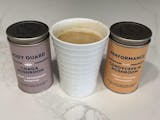Reishi Helps Reduce Symptoms of Diabetes
Reishi and its Activity Against Diseases
Diabetes is a group of diseases that result in irregular levels of blood sugar. The Center for Disease Control and Prevention states that more than 30 million people in the United States have diabetes and more than 84 million US adults—over a third—have prediabetes, a condition in which blood sugar is dangerously high, but not high enough to be type 2 diabetes. Sugar consumption is a major cause of many chronic diseases, being a strong facilitator of inflammation and pathogenic growths.
Data from different studies suggest that Reishi intake helps in modulating blood glucose levels.
A human clinical study of 71 adult patients with confirmed type 2 diabetes mellitus were supplemented with Reishi water extract. Patients received either Reishi extract or placebo orally at 5.4 grams daily for 12 weeks. The patients that consumed Reishi extract showed a significant decrease in glycosylated hemoglobin and plasma glucose after 12 weeks, compared to the placebo group that showed little effect. The level of glycosylated hemoglobin and plasma glucose is increased in the red blood cells of persons with poorly controlled diabetes mellitus. The study directly indicates a hypoglycemic effect when using Reishi extract. (1)
In a more recent study, oral administration of Reishi hot water extract for 4 weeks was found to lower the serum glucose levels in obese/diabetic animals, with effects seen as soon as the first week of treatment. (2) The data demonstrates that Reishi consumption can provide beneficial effects in treating type 2 diabetes. A similar study of diabetic mice treated with Reishi for 30 days showed the same results. Following the treatment, serum insulin levels increased (compared with the nontreated diabetic group) and glucose levels decreased in a dose-dependent way. (3)
Ganoderans A, B, and C (polysaccharides from Reishi) seem to play a major role in the hypoglycemic effects of this fungi. Effects include decreased plasma glucose concentrations by up to 50% with positive activity even after 24 hours of ingestion. The study also showed increased plasma insulin, decreased hepatic glycogen content, and modulation of glucose-metabolizing enzymes in the liver. (4)(5)
A separate study performed both in-vivo (test tube) and in-vivo (animal) studies to monitor the effects of Reishi's hot-water extract against hyperlipidemia, a condition in which there are high levels of fat particles (lipids) in the blood. The study showed lowered plasma levels of total cholesterol, triglyceride, and LDL cholesterol and increased high-density lipoprotein (HDL) cholesterol. This essentially means lowering levels of harmful cholesterol while increasing beneficial cholesterol within the body, withstanding the complications seen in type 2 diabetes. (6)
HDL cholesterol helps remove the bad cholesterol from your bloodstream, which is the reason low levels of HDL cholesterol are consistently associated with increased risk of type 2 diabetes. (7)
More human clinical trials are needed to better understand the mechanism between Reishi and diabetes symptoms.
Click on other conditions to continue exploring studies done on Reishi:
References:
1. Gao Y, Lan J, Dai X, Ye J, Zhou S. A phase I/II study of Lingzhi mushroom Ganoderma lucidum (W. Curt.: Fr.) Lloyd (Aphyllophoromycetideae) extract in patients with type II diabetes mellitus. Int J Med Mushrooms. 2004;6:33–40
2. https://www.ncbi.nlm.nih.gov/pubmed/19109000
3. Jia J, Zhang X, Hu Y. S, editors. et al. Evaluation of in vivo antioxidant activities of Ganoderma lucidum poly- saccharides in STZ-diabetic rats. Food Chem. 2009;115:32–6
4. https://www.ncbi.nlm.nih.gov/pubmed/3840903
5. https://www.ncbi.nlm.nih.gov/pubmed/2682700
6. https://www.ncbi.nlm.nih.gov/pubmed/30806268
7. https://www.ncbi.nlm.nih.gov/pmc/articles/PMC5877920/

